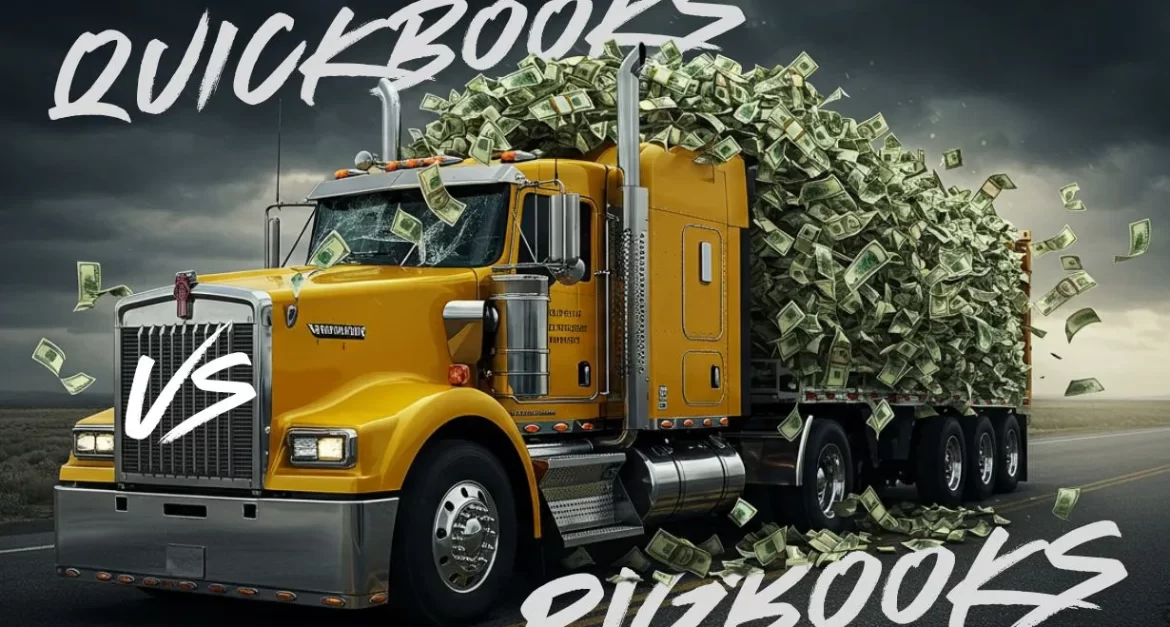
Quickbooks vs Rigbooks – The pros and cons for Owner Operators.
No time to read through this? You can press play on this audio podcast and follow us for more in our spotify channel.
When you’re an owner operator in the trucking business, keeping track of every dollar and mile can feel like juggling two jobs at once. On one hand, you have the day-to-day challenges of managing loads, scheduling dispatch, maintaining your truck, and complying with regulations like IFTA. On the other hand, you must ensure that your bookkeeping, reports, and tax filings are accurate and up to date. That’s where the right accounting software can save you time, money, and headaches.
In this post, we’ll take a friendly, in-depth look at two popular options: QuickBooks and Rigbooks. While QuickBooks is famous for serving all sorts of small businesses, Rigbooks specifically tailors its services for the trucking industry. We’ll explore which solution might be best for your needs as an owner-operator—all in a conversational way that avoids overwhelming jargon. By the end, you’ll have a clearer idea of which platform can help you handle everything from mileage tracking and cost-per-mile calculations to payroll (if you have employees) and beyond.
1. Why Accounting Software Matters for Truckers
Let’s face it: owning and driving your own rig isn’t just a job—it’s practically a lifestyle. Whether you’re hauling cross-country or running shorter regional routes, the ability to accurately log income, expenses, and miles is crucial. Not only do you have to watch your bottom line, but you also need robust maintenance records to keep that truck on the road. Throw in tax obligations, such as filing your quarterly IFTA reports, and the workload can get heavy in a hurry.
That’s where accounting and bookkeeping tools come in. At a minimum, you’ll need software that can:
- Track revenue from loads and freight hauls.
- Categorize and analyze expenses—from fuel to repairs and insurance.
- Simplify IFTA and other compliance requirements.
- Provide insights into cost-per-mile and overall profitability.
- Generate reports that help you stay organized and tax-ready.
But which platform handles all of that (and more) most effectively? Let’s compare Rigbooks and QuickBooks side by side.


2. QuickBooks: A Household Name with Broad Capabilities
Chances are you’ve already heard of QuickBooks. It’s one of the most popular accounting software solutions for small and medium-sized businesses of all kinds. According to many reviews and resources, QuickBooks shines in the following areas:
- All-Purpose Accounting: QuickBooks lets you manage invoices, generate financial reports like profit and loss statements, and handle a wide variety of bookkeeping tasks.
- Ease of Use: It has a relatively gentle learning curve, with plenty of tutorials and forums to help you figure things out.
- Integration: QuickBooks connects with countless other apps, which can be a game-changer if you’re already using certain banking, e-commerce, or payroll solutions.
- Popularity Among Accountants: Because it’s so widespread, many accountants or tax preparers are intimately familiar with it. That can make your life simpler when you’re ready to hand off your reports for year-end taxes.
However, being an all-purpose software does have some drawbacks for trucking professionals:
- Limited IFTA Features: QuickBooks doesn’t provide specialized IFTA reporting out of the box. You’ll often need third-party tools or manual calculations to handle multi-state mileage and fuel-tax reporting.
- Trucking-Specific Metrics: While QuickBooks does have a mileage tracking feature, it’s generally aimed at basic IRS tax deductions, not the operational detail you might want for cost-per-mile analysis.
- Extra Costs: Features like payroll are add-ons, which can drive up your monthly subscription. The more robust your business needs, the pricier QuickBooks can become.
Still, if you want an established platform with broad features—and are comfortable finding workarounds for the trucking aspects—QuickBooks can definitely do the job. For current pricing, you can check the QuickBooks® Online Pricing page. Plans often start with a limited-time discount, then increase in price after a few months.
3. Rigbooks: Designed Specifically for the Trucking World
Unlike QuickBooks, Rigbooks was built with owner-operators and small fleet owners in mind. It focuses on the exact details you juggle every week—from calculating cost-per-mile to generating IFTA forms.
Here’s what makes Rigbooks appealing to many truckers:
- IFTA and Fuel Tracking: You can track your fuel purchases, mileage, and cost-per-mile with minimal effort. Rigbooks pulls in the latest fuel tax rates and automates a lot of the heavier calculations.
- Maintenance Record-Keeping: Rigbooks makes it straightforward to log repairs and upgrades, keep receipts, and set reminders for routine maintenance tasks.
- Seamless Invoicing from Trip Data: The system links your trip logs to invoice generation, so you can create bills right after you finish a haul—no double data entry.
- Cost-Per-Mile Analysis: You’ll see real-time insights into your profitability on a per-load basis, helping you decide which loads are worth taking and which aren’t.
Where Rigbooks might fall short compared to QuickBooks:
- General Accounting: Rigbooks doesn’t offer as broad a set of accounting features as QuickBooks. You can still handle basic income and expense tracking, but certain business needs (like advanced inventory or multi-currency transactions) aren’t a main focus.
- Payroll: If you employ other drivers, you’ll need a separate payroll service because Rigbooks does not have a built-in payroll module.
- Reporting Depth: While Rigbooks offers trucking-centric reports, it’s not as extensive in general accounting statements, such as advanced balance sheet customizations.
Pricing for Rigbooks is subscription-based, typically starting as low as $19 for a single truck. If you’re curious, the Rigbooks Pricing page outlines different tiers for leased owner-operators, independent owner-operators, and small fleets.
4. QuickBooks vs. Rigbooks: A Handy Comparison Table
Sometimes it helps to see how each platform stacks up in a simple format. Below is a quick comparison that highlights the trucking-oriented features you might care about most:
| Feature | QuickBooks | Rigbooks |
|---|---|---|
| Target Audience | Broad range of small to medium businesses in various industries. | Specifically built for trucking owner-operators and small fleets. |
| IFTA Integration | Requires manual calculations or third-party plugins. | Built-in IFTA tracking and auto-generated reports. |
| Mileage Tracking | Basic mileage tool primarily for tax deductions. | Detailed fuel and mileage tracking with automatic cost-per-mile calculations. |
| Invoicing | Customizable invoices for multiple industries and automated reminders. | Direct invoicing from trip logs, reduces double data-entry. |
| Maintenance | Logged as general expenses or in custom fields. | Specific truck/trailer maintenance records with odometer-based tracking. |
| Payroll | Available as an add-on for an additional fee. | Requires external payroll solution; no built-in option. |
| Reports | Comprehensive general reports (P&L, Balance Sheet, Cash Flow, etc.). | Focus on trucking-centric reports (fuel consumption, cost-per-mile, etc.). |
| Pricing | Multiple tiers; costs can increase with extra features. | More cost-effective for single-truck operations; scaled plans for fleets. |
| Ease of Use | Very user-friendly, with many tutorials and accountant familiarity. | Intuitive interface specifically designed for trucking workflows. |
| Best For | Truckers needing broad business capabilities and robust accounting features. | Those who want a specialized trucking tool with built-in IFTA and cost-per-mile insights. |
5. Key Insights for Owner-Operators
- IFTA Reporting Is Crucial: If you’re crossing state lines, you’ll need to handle IFTA returns. Rigbooks automates a large part of that process. QuickBooks doesn’t, so budget extra time (or money) if you go that route.
- Level of Detail Needed: Do you want a deep analysis of each load’s profitability? Rigbooks calculates cost-per-mile down to each trip, which can be incredibly helpful for making data-driven decisions. QuickBooks can do it—just not without extra manual work or custom spreadsheets.
- Payroll Considerations: If you plan to add more drivers, QuickBooks has an optional payroll add-on, which may be convenient for a growing operation. Rigbooks, on the other hand, will require an external payroll solution.
- Scalability: QuickBooks is known to scale well if your business diversifies or your administrative needs become more complex. Rigbooks also has plans for a growing fleet, but the range of general accounting and advanced financial tools is smaller.
- Accounting Familiarity: Some owners prefer to have a system their CPA already knows. QuickBooks is practically the industry standard among accountants. With Rigbooks, you may need to spend some time showing your accountant how to retrieve or interpret the trucking-focused reports.
6. Practical Implications Beyond the Software
- Better Cost Management: Whether you’re using QuickBooks or Rigbooks, simply adopting a proper accounting system can reduce financial chaos. You’ll be more aware of your operational expenses (fuel, tolls, repairs) and can compare them against your revenue.
- Smoother Tax Season: Having your numbers in order means fewer surprises. QuickBooks excels at preparing common tax forms, while Rigbooks helps ensure you don’t miss any IFTA details—both invaluable for the dreaded tax season.
- Improved Decision-Making: Want to figure out which routes or customers are most profitable? Having up-to-date, accurate data from your software is a game-changer. If you’re looking to pivot from short hauls to a national route, the right reports can guide that choice.
- Time Savings: Manual bookkeeping can eat up hours—time better spent driving or negotiating higher-paying loads. An automated system puts essential info at your fingertips.
7. Making the Choice
So, which accounting software wins the battle for trucking owner-operators—QuickBooks or Rigbooks? Honestly, it depends on what you value most:
- Pick QuickBooks If:
- You want a versatile, widely recognized software solution.
- You need or anticipate more sophisticated accounting features.
- You plan to integrate with advanced or specialized third-party apps.
- You prefer having optional in-app payroll and are willing to pay extra for it.
- You’re comfortable with partial manual processes for your IFTA filings and cost-per-mile breakdowns.
- Pick Rigbooks If:
- You want a one-stop shop for IFTA, mileage tracking, and dispatch invoicing.
- Your main priority is detailed reporting on every load, from cost-per-mile to fuel usage.
- You value the fact that it’s tailored specifically to trucking.
- You want simpler, more focused bookkeeping without loads of non-essential features.
- You can handle running a separate payroll service if you have employees (or don’t need payroll at all).
A lot of owner-operators find it helpful to test both. QuickBooks often offers free trials or discounted introductory pricing. Rigbooks provides a 30-day free trial that’ll let you see how it handles real loads, fuel receipts, and mile-by-mile costs. Taking a test drive (pun intended!) can show you firsthand which software feels most natural to you.
8. Final Thoughts
Your truck, your business, and your finances are all part of the same journey. Choosing the right accounting platform—whether that’s the all-purpose QuickBooks or the trucking-focused Rigbooks—can make a tremendous difference in how smoothly that journey goes. By investing in a system that handles reports, calculations, and compliance, you’re free to focus on what really matters: running a profitable, low-stress operation on the open road.
Remember, no two owner-operators have exactly the same business model. The best way to know what works is to give each solution a test run. It’s well worth the little bit of extra time—and small subscription fee—to ensure your software supports you in the long haul.
Safe travels and happy hauling!